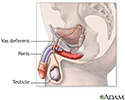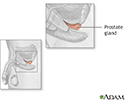Delayed ejaculation
Ejaculatory incompetence; Sex - delayed ejaculation; Anejaculation; Infertility - delayed ejaculation
Delayed ejaculation is a medical condition in which a male cannot ejaculate easily or at all. It may occur either during intercourse or by manual stimulation with or without a partner. Ejaculation is when semen is released from the penis.
Causes
Most men can ejaculate within a few minutes of starting to thrust during intercourse. Men with delayed ejaculation may be unable to ejaculate or may only be able to ejaculate with great effort after having intercourse for a long time (for example, 30 to 45 minutes).
Delayed ejaculation can have psychological or physical causes.
Common psychological causes include:
- Religious background that makes the person view sex as sinful
- Lack of attraction for a partner
- Conditioning caused by a habit of excessive masturbation
- Traumatic events (such as being discovered masturbating or having illicit sex, or learning one's partner is having an affair)
Some factors, such as anger toward the partner, may be involved.
Physical causes may include:
- Blockage of the ducts that semen passes through
- Use of certain medicines
- Nervous system diseases, such as stroke or nerve damage to the spinal cord or back
- Nerve damage during surgery in the pelvis
Exams and Tests
Stimulating the penis with a vibrator or other device may determine whether you have a physical problem. This is often a nervous system problem. A nervous system (neurological) exam may reveal other nerve problems that are connected with delayed ejaculation.
An ultrasound can show a blockage of the ejaculatory ducts.
Treatment
If you have never ejaculated through any form of stimulation, see your health care provider to determine if the problem has a physical cause. (Examples of stimulation may include wet dreams, masturbation, or intercourse.) Your provider may refer you to a urologist for additional evaluation and advice.
See a therapist who specializes in ejaculation problems if you are unable to ejaculate in an acceptable amount of time. Sex therapy most often includes both partners. In most cases, the therapist will teach you about the sexual response. You also will learn how to communicate and guide your partner to provide the right stimulation.
Therapy often involves a series of "homework" assignments. In the privacy of your home, you and your partner engage in sexual activities that reduce performance pressure and focus on pleasure.
Typically, you will not have sexual intercourse for a certain period of time. In this time, you will gradually learn to enjoy ejaculation through other types of stimulation.
In cases where there is a problem with the relationship or a lack of sexual desire, you may need therapy to improve your relationship and emotional intimacy.
Sometimes, hypnosis may be a helpful addition to therapy. This may be useful if one partner is not willing to participate in therapy. Trying to self-treat this problem is often not successful.
If a medicine may be the cause of the problem, discuss other medicine options with your care provider. Never stop taking any medicine without first talking to your provider.
Outlook (Prognosis)
Treatment commonly requires about 12 to 18 sessions. The average success rate is 70% to 80%.
You will have a better outcome if:
- You have a past history of satisfying sexual experiences.
- The problem has not been occurring for a long time.
- You have feelings of sexual desire.
- You feel love or attraction toward your sexual partner.
- You are motivated to get treated.
- You do not have serious psychological problems.
If medicines are causing the problem, your provider may recommend switching or stopping the medicine, if possible. A full recovery is possible if this can be done.
Possible Complications
If the problem is not treated, the following may occur:
- Avoidance of sexual contact
- Inhibited sexual desire
- Stress within the relationship
- Sexual dissatisfaction
- Difficulty with conception and getting pregnant
If you and your partner are trying to get pregnant, sperm can be collected using other methods.
Prevention
Having a healthy attitude about your sexuality and genitals helps prevent delayed ejaculation. Realize that you cannot force yourself to have a sexual response, just as you cannot force yourself to go to sleep or to perspire. The harder you try to have a certain sexual response, the harder it may become to respond.
To reduce the pressure, focus on the pleasure of the moment. Do not worry about whether or when you will ejaculate. Your partner can help by creating a relaxed atmosphere, and by not pressuring you about whether or not you have ejaculated. Openly discuss any fears or anxieties, such as fear of pregnancy or disease, with your partner.
References
Bhasin S, Basson R. Sexual dysfunction in men and women. In: Melmed S, Auchus RJ, Goldfine AB, Koenig RJ, Rosen CJ, eds. Williams Textbook of Endocrinology. 14th ed. Philadelphia, PA: Elsevier; 2020:chap 20.
McMahon CG. Disorders of male orgasm and ejaculation. In: Partin AW, Dmochowski RR, Kavoussi LR, Peters CA, eds. Campbell-Walsh-Wein Urology. 12th ed. Philadelphia, PA: Elsevier; 2021:chap 71.
Shafer LC. Sexual disorders or sexual dysfunction. In: Stern TA, Freudenreich O, Smith FA, Fricchione GL, Rosenbaum JF, eds. Massachusetts General Hospital Handbook of General Hospital Psychiatry. 7th ed. Philadelphia, PA: Elsevier; 2018:chap 25.
Review Date: 3/31/2024





